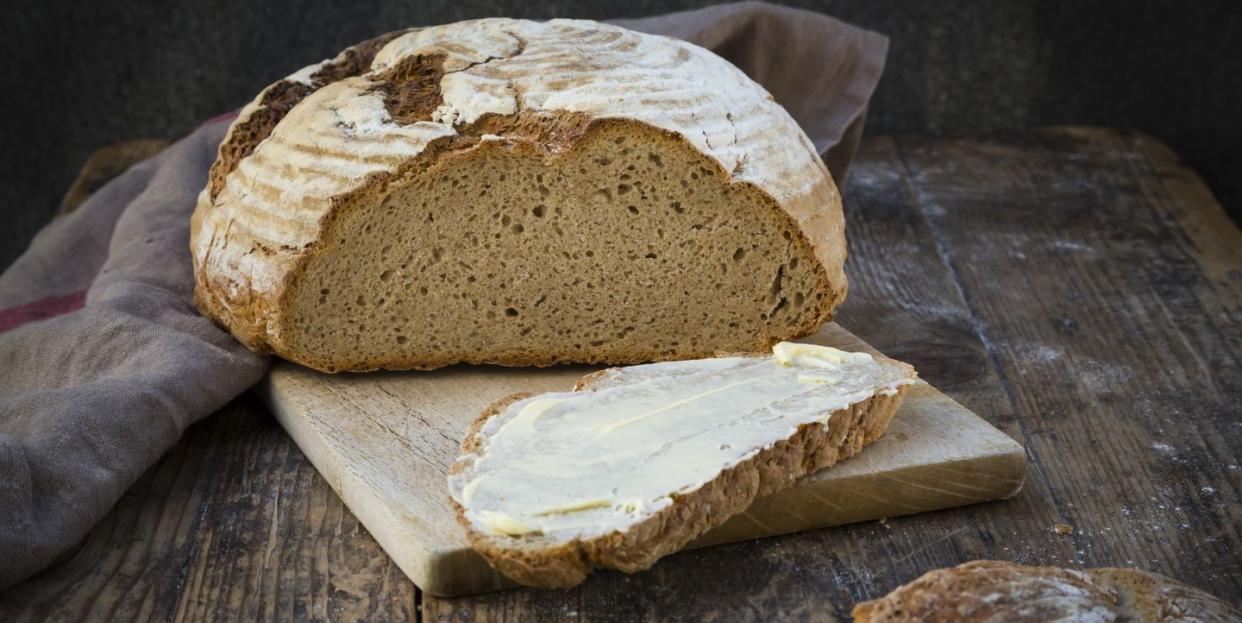Ruth Reichl on the Benediction of Baking Bread as the World Burns

“You might,” said our house-sitter bitterly, “have given me some notice.”
I couldn’t blame her. Having spent the last few months in Los Angeles, we’d been blind to the catastrophe heading our way. People there live cloistered lives, always in their cars, and like everyone else we’d listened to the news then gone blindly off to work. We kept appointments, dined at restaurants, spent weekends with our friends. But fear finally crept in, a pernicious fog blanketing the city. “The virus is here,” people cried, “they’re going to close the airports!”
We packed. We ran.
Far too late for hand sanitizer, alcohol, or even Clorox Wipes, we boarded the plane armed with rubber gloves, a bottle of hydrogen peroxide and a roll of paper towels. We had masks, too—gifts from a friend, who’d meant them as a joke. But that was last week, in another lifetime.
Returning to our rural hamlet, we thought we were prepared for the worst. Although the house-sitter had left no toilet paper, no paper towels, no soap, no bread, no butter, I was utterly unconcerned. “I’ll just run over to the supermarket,” I said blithely.
But even from outside I could tell that things had changed. The parking lot was packed. A huge hand-lettered sign on the door read, “Sorry. We have no bread. None.” There were also no paper products, no pasta, no canned tomatoes, no chicken, no frozen vegetables, no butter… I stared, incredulous, at empty shelves.
A rugged woman stood across the aisle, arms crossed. “It’s the city people. They come up here and take everything. It shouldn’t be allowed.”
I headed to one of the local farms that are the backbone of our rural economy. They all have little honor shops; you take what you want and leave the money. Now, for the first time in more than 20 years I found the door locked. "We’re practicing social distancing." The farmer was apologetic when I knocked. "Tell me what you want, and I’ll bring it out."

"Could I have a dozen eggs?" She brought three dozen. "Eggs keep," she said. Did I hear her murmur "city people," under her breath? "Hey," she called as I was leaving, "you’re a baker. Making bread? I’ll gladly trade."
But did I have flour? I hadn’t thought to check.
Driving home I passed a neighbor. She honked, waved, leaned out the window. "Any idea where I can buy flour? There’s no bread, and now I can’t find flour."
"Order online from King Arthur," I suggested. She shook her head. "They’re out."
In that moment, it finally hit me: this is what war must be. The reports of mounting death toll are terrifying. Closed schools and restaurants are deeply upsetting. Staying home is hard. We all watch our savings dwindle, day by day. I’ve been poor before, but I have never, in my entire lifetime, encountered grocery stores with empty shelves. I have never worried that food might be rationed. I have never considered bread a luxury.
I drove home praying for flour. And there it was; the house-sitter, no cook, had left my pantry untouched. I scooped the flour into a bowl, added yeast and water, kneaded fiercely. The cats purred at my feet. Outside it began to snow. While the dough rose I prowled the pantry, grateful for the oils, vinegars, grains, beans, and condiments I’ve collected through the years.
Then I checked the freezer. All the cherries, berries, tomatoes, and corn I saved last summer glimmered up at me like frozen jewels. And what were those strange little packages? Rinds of Parmesan, dozens, saved for some rainy day.
I gathered them up and rummaged through the refrigerator, unearthing desiccated carrots, a pathetic stalk of antique celery, a few shriveled sprigs of parsley. I sliced a couple heads of garlic, sautéed them in a slick of oil, tossed in an onion. On a back shelf I uncovered a neglected bag of kelp with a sell-by date of 2007. Dried seaweed lasts forever; in it went, along with the cheese rinds, a couple quarts of water and a strip of lemon zest.
The soup burbled. The bread rose. Soon the comforting aroma of bread began to fill the kitchen, mingle with the scent of soup and swirl through the house. It felt like a benediction.
In the morning I found our town supervisor had sent us all a note. “I have secured a large quantity of hand sanitizer. Contact me if you would like some.”
“Twenty minutes,” he replies when I email back. “Townhall. Bring a 4-ounce container.”
Our encounter in the parking lot feels as furtive as a dope deal. We both wear gloves. Pouring the liquid into my container he says he’s just laid off the entire staff at his pizza parlor. Tears fill his eyes. “The future,” he says, “seems awful bleak.”
Wordlessly I hold out a loaf of bread.
It isn’t much, but it’s what I have. I’ll take the other loaf to the flourless neighbor. I’ll bake some more. I don’t know what else to do.
You Might Also Like

